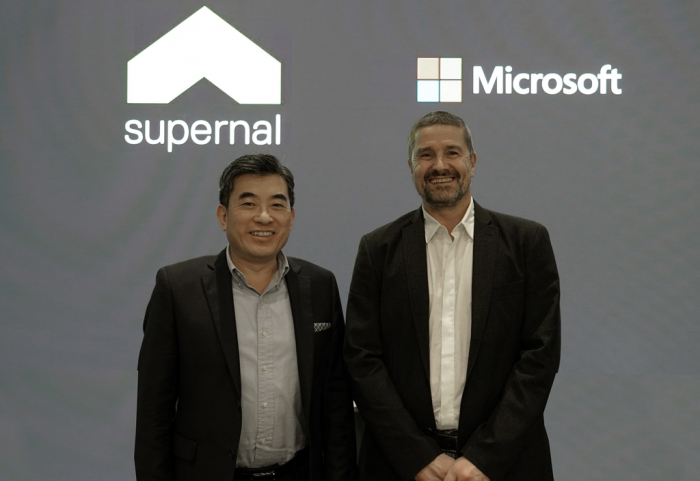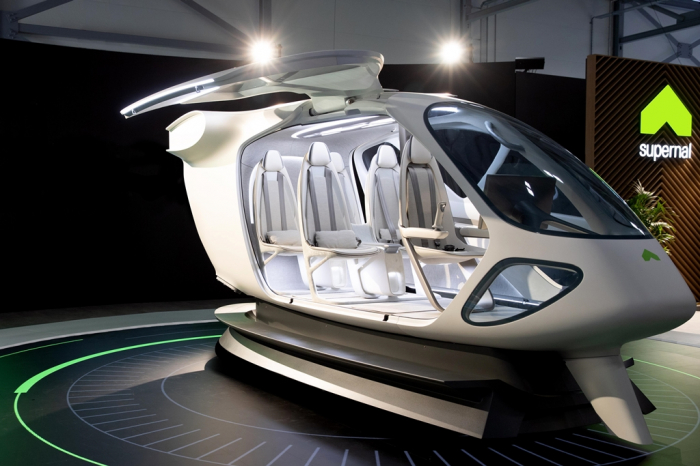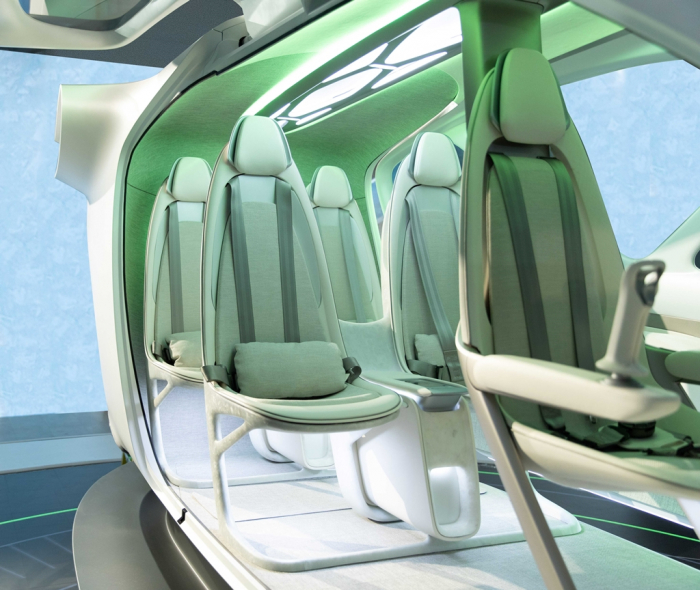Future mobility
Hyundai’s Supernal, Microsoft to collaborate on UAM projects
Using the Azure platform, Supernal aims to launch safe flying cars by 2028 and regional air mobility in the 2030s
By Jan 04, 2023 (Gmt+09:00)
3
Min read
Most Read
LG Chem to sell water filter business to Glenwood PE for $692 million


KT&G eyes overseas M&A after rejecting activist fund's offer


Kyobo Life poised to buy Japan’s SBI Group-owned savings bank


StockX in merger talks with Naver’s online reseller Kream


Meritz backs half of ex-manager’s $210 mn hedge fund



Supernal LLC, the urban air mobility affiliate of South Korea’s top automaker Hyundai Motor Co., and US tech giant Microsoft Corp. have agreed to jointly advance critical technology for the aviation industry.
Under the agreement, Supernal will leverage Microsoft Azure, the US firm’s cloud computing platform, to run secure simulations at scale and accelerate its timeline to commercialize advanced air mobility (AAM) services, Hyundai said on Wednesday.
Microsoft can benefit from Supernal’s industry insights and experiences to enhance its customer-driven product innovation, including further enabling AAM companies to test and train simulations, the two partners said.
During the initial phase of their collaboration, Microsoft will provide Supernal early access to Project AirSim, an artificial intelligence (AI)-based simulation platform, to safely build, test, train and validate autonomous aircraft transportation through simulation.
Project AirSim uses Azure to generate significant amounts of environment and sensory data to train machine-learning models that simulate all phases of flight and variable weather patterns.
It also provides libraries of pre-trained AI models and planet-scale 3D environments representing urban and rural landscapes as well as a partner ecosystem offering synthetic data generation to help advance autonomous flights.
Supernal said it is looking to use Microsoft’s mixed reality (MR) headset, HoloLens 2, to create augmented reality (AR) applications for future vehicle and manufacturing operations.
"We are pleased to collaborate with Microsoft, a software leader, in responsibly advancing AAM autonomous systems and information sharing,” said Shin Jai-won, president of Hyundai Motor Group and chief executive of Supernal.

NEW FRONTIER OF TRANSPORTATION
The partnership comes as global automakers and tech companies compete to develop aviation infrastructure for electrical vertical take-off and landing (eVTOL) aircraft such as autonomous cargo drones and air taxis.
Supernal, wholly owned by Hyundai Motor, is already collaborating with external partners and more than 50 Hyundai affiliates, in business areas spanning automobiles, automotive parts, construction, robotics and autonomous driving, to jointly create the AAM value chain.
Headquartered in Washington D.C., Supernal plans to develop air vehicles and provide a transportation system that combines UAM and existing traffic networks. It is also considering operating a ride-sharing platform.
Supernal has been researching air mobility with the City of Los Angeles and Urban Movement Labs.
“In ushering in a new frontier of transportation with AAM, Supernal has an obligation to ensure safe and secure deployment of eVTOL vehicles,” Shin said.
A former aeronautics expert who worked at NASA in the US, Shin joined Hyundai in September 2019 to lead the UAM division.
In July 2022, Supernal unveiled the cabin concept of its flying car at a UK air show, providing the first look at how Hyundai Motor Group is integrating its car technology to develop AAM vehicles.

COMMERCIAL UAM SERVICE IN 2028, RAM SERVICE IN 2030s
The company is working to certify its eVTOL vehicles for commercial use in the US starting in 2028, and in the EU and the UK shortly after.
While Supernal’s battery-powered eVTOL vehicle is designed for intra-city passenger transportation, the group’s Korea-based affiliates focus on developing regional air mobility (RAM), based on hydrogen-powered vehicles for cargo and passenger journeys. Hyundai aims to launch its hydrogen vehicle service in the 2030s.
"Air transport is a key pillar in the democratization of mobility, connecting more people, goods and places through safe flight experiences," said Ulrich Homann, corporate vice president in charge of Microsoft’s cloud and AI services.
Hyundai Motor Group has been shifting its business focus toward UAM and other future mobility services.
Chairman Chung Euisun said automobiles eventually will account for just half of the group’s sales, followed by UAM with 30% and robotics at 20%.
Write to Il-Gue Kim at Black0419@hankyung.com
In-Soo Nam edited this article.
More to Read
-
 Future mobilityHyundai Motor, Indonesia to jointly enter ASEAN air mobility market
Future mobilityHyundai Motor, Indonesia to jointly enter ASEAN air mobility marketNov 14, 2022 (Gmt+09:00)
2 Min read -
 Future mobilityHyundai’s Supernal showcases flying electric car at UK air show
Future mobilityHyundai’s Supernal showcases flying electric car at UK air showJul 19, 2022 (Gmt+09:00)
3 Min read -
 Future mobilityLotte joins Korea’s UAM race as Hyundai closes ranks with others
Future mobilityLotte joins Korea’s UAM race as Hyundai closes ranks with othersNov 16, 2021 (Gmt+09:00)
3 Min read -
 Future MobilityHyundai to set up UAM research center in LA next year
Future MobilityHyundai to set up UAM research center in LA next yearNov 10, 2021 (Gmt+09:00)
1 Min read -
 Future mobilityHyundai Motor hires US aerospace expert as UAM business CTO
Future mobilityHyundai Motor hires US aerospace expert as UAM business CTOFeb 24, 2021 (Gmt+09:00)
2 Min read -
 New Hyundai Motor Chairman Chung Euisun sets sights on future mobility
New Hyundai Motor Chairman Chung Euisun sets sights on future mobilityOct 14, 2020 (Gmt+09:00)
4 Min read
Comment 0
LOG IN


